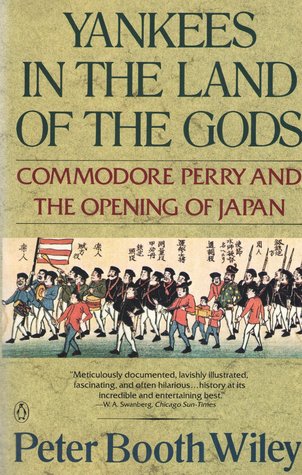In the spring of 1847, Ranald McDonald, half Chinook Indian and half Scots, jumped ship from the Yankee whaler Plymouth and steered his stolen dory toward Rishiri, a small island in the Japanese archipelago. Having heard tales of Nippon for years—a land of cannibals, American sailors whispered; no place to be shipwrecked—the curious McDonald, who had roamed over much of the world, thought to have a look at the place for himself.
He saw Japan from the inside, all right: the inside of an imperial jailhouse, where for seven months he was insistently but gently interrogated by officers of the Tokugawa shogunate, the dynasty that had ruled Japan since 1600 and that would endure but a generation more. Satisfied that he was not a spy, the shogun’s agents in time released McDonald, returning him to a passing English freighter along with an assortment of shipwrecked European sailors, all of them bodily intact. McDonald made his way back to the port of New York, where he recounted his adventures to those few who would listen, among them a young naval officer named Matthew Galbraith Perry.
The Japanese had reason to suspect McDonald’s intentions. Three centuries earlier the ruling clans had offered their hospitality to passing Portuguese crews; in return they received the gifts of smallpox, firearms, and Christianity, all of which took decades to suppress. Other Europeans followed the Portuguese, especially the Dutch and the British, who seemed bent on stripping the island, of its treasures. Soon the Japanese, tired of gaijin intrigues, slammed the gates shut, and the foreigners turned their attention elsewhere. By the time of McDonald’s impromptu visit, the principal European powers had carved up neighboring China, installed feuding warlords, and converted the Middle Kingdom’s economy to serve the opium trade.
The Tokugawa shogunate reasoned, and with cause, that they would fare no better than the Chinese were they to fall under foreign influence. Tell your people, the shogun instructed McDonald, to stay away. But, as Peter Wiley writes in Yankees in the Land of the Gods, their warning did no good, flying as it did in the face of Manifest Destiny and America’s expansion into a tricoastal power, one that would soon spread over the globe.
The United States had been an economic force in the Atlantic for half a century. The newly won lands of the Southwest and California gave it a window on the Pacific at just about the time McDonald returned to New York. Three rival American steamship companies, all of whose directors Matthew Perry advised, established Manhattan-to-San Francisco routes by way of Cape Horn, and soon all Asia lay within their reach. But Japan’s refusal to welcome the newcomers rankled; one American official wrote, “I am sure that the Japanese policy of seclusion is not according to Cod’s plan of bringing the nations of the earth to a knowledge of His truth,” thus granting efforts to penetrate the silk curtain the legitimacy of a new crusade.
Matthew Perry, newly promoted to the rank of commodore, was primed for the adventure. On the seventh of July 1853, he led an American squadron of four warships carrying 61 cannon and almost a thousand men into Tokyo Bay, trained his guns on the Japanese harbor fortresses, and demanded anchorage. Asked the purpose of his mission. Perry replied that his crew was undertaking a survey of the Japanese islands. When told that such an incursion was forbidden under Japanese mandate, Perry sniffed that it was perfectly legal under American law.
The relatively simple chain of events leading up to Perry’s first encounter with the Tokugawa occupy slightly more than half of Peter Wiley’s study, for, borrowing a page from Simon Schama and other recent adherents to annaliste methods of history, Wiley loads his narrative with all manner of suggestive detail. His text is full of arcana on maritime discovery, shipping routes from Hong Kong to points east, Japanese court conventions, international struggles for fishing rights, and the like; these oddments are uniformly interesting, for Wiley, a practiced journalist, knows how to tell a good story well. Still, they are not strictly necessary, and they sometimes burden an already long text.
Wiley’s story becomes more compelling, and Yankees in the Land of the Gods picks up speed, with the aftermath of Perry’s opening of Japan to foreign commerce. Free trade, Wiley notes, did not bring the dreaded opium market to Japan.
Instead, it exposed a comparatively tranquil nation—at least one content to stay at home—to the wide world. With the development of first-class seaports and new modes of manufacture, the latter requiring raw materials that the islands did not possess, Japan became host to all manner of foreign cultures (lending it its modern, voracious appetite for all things exotic) and an acquisitive seagoing power in its own right. Although Wiley doesn’t outright say so, without Perry’s-arrival one suspects that there might have been no Pearl Harbor.
Instead—and here Peter Wiley’s analysis, supported by material from Japanese scholar Korogi Ichiro, becomes most powerful—two nations were thrust into the mistrustful proximity that marks their relationship to this day. Fearful of any foreign influence and ideologically assured of their own ethnic and cultural superiority, the Japanese quickly learned the tricks of all the modern world’s trades and became more adept at them than were their teachers; the Americans unloaded goods that had scarcely any worth at home and developed an attachment to the cheap labor and commodities of the far-off archipelago. The story is one that we’re reminded of every day in an America full of Honda Accords and Mitsubishi VCRs. The great accomplishment of Peter Wiley’s fine book is to trace that tale to its origins in the minds of such ambitious men as Matthew Perry and Ranald McDonald, who transformed the world without ever knowing it.
[Yankees in the Land of the Gods, by Peter Booth Wiley, with Korogi Ichiro (New York: Viking) 578 pp., $24.95]

Leave a Reply